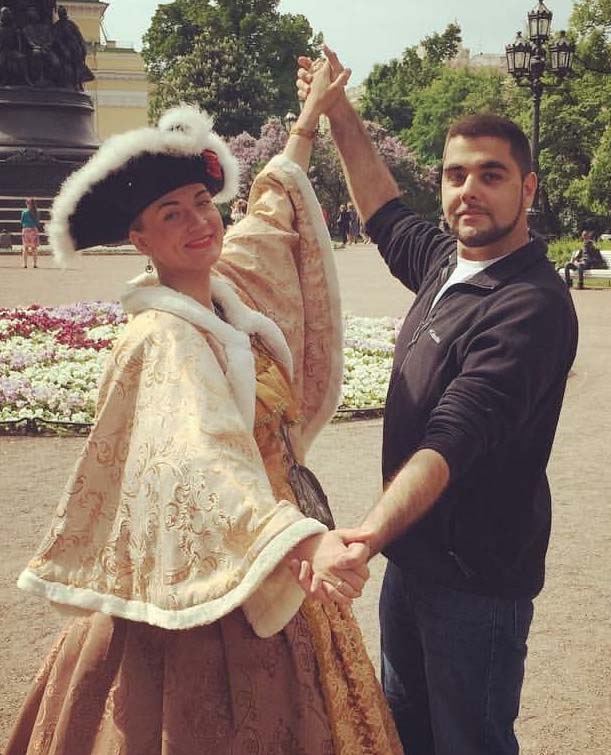History Peeps: Dr. Stephen B. Riegg, Assistant Professor of History

Professor Stephen Riegg dances with a costumed interpreter of Enlightenment tzarina, Catherine the Great, at Catherine’s Palace outside St. Petersburg, Russia, during more peaceful times.
History sometimes seems abstract and distant but other times its relevancy is blindingly obvious. No one doubts the current salience of Dr. Stephen Riegg’s work. An expert on Russian history, he has recently published Russia’s Entangled Embrace: The Tsarist Empire and The Armenians, 1801-1914, on the Romanov dynasty’s relationship with minority ethnic groups in the Caucasus region. Like many, he was shocked by Russia’s recent invasion of Ukraine and is concerned for the Ukrainian people who are the “number one victims of this Russian aggression.” As a historian, he’s also mystified by the irrationality of Russian President Vladimir Putin’s actions. Says Dr. Riegg, “I cannot think of a single way that this is a boon, a win, anything for Russia – not militarily, not economically, not even socially since this is not unifying the Russian people behind the war. It’s an unbelievable catastrophe and the Russian people will live with the fallout for years to come.”
Riegg has a deep emotional connection to and passion for his subject, as he is quick to acknowledge. In fact, he argues that passion is almost a necessity when teaching at the university level since “your students know if you are enthused or fascinated by a topic and will give you their attention if you are.” He credits this insight to two undergraduate history professors he had at the University of Kansas, Eve Levin and Gerald Mikkelson, whose heartfelt love for Russian history inspired him to pursue graduate study in the subject.
Dr. Riegg has taught at Texas A&M for six years and considers himself lucky to work with Aggies who are “almost always driven and excited to learn.” He also appreciates the university’s healthy enthusiasm for traditions and a strong school culture. Outside of the classroom, Dr. Riegg enjoys reading mystery novels, particularly those of Agatha Christie, whose full canon of eighty books he aspires to finish one day. He also has a third degree-brown belt in judo, a sport he originally took up in graduate school to burn off steam and distract him from reading dry historical theory. Although he hasn’t competed at judo since Covid hit, he hopes to begin again soon.
To what historical figure would Dr. Riegg like to say “Howdy” if given the chance? Dr. Riegg picks Catherine the Great, the eighteenth-century Tsarina of Russia, since “she was an enlightened despot and I’d like to better understand her perspective and how she ruled on a day-to-day basis.” He particularly credits Catherine for implementing modernization reforms in the face of strong opposition from the Russian nobility, which “took enormous political savvy and shows that even absolute leaders have to rule with at least some buy-in from their subjects.”
(Patrick Grigsby)
